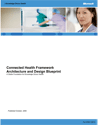 To encourage the creation of health information networks that serve the broadest range of healthcare needs, Microsoft has developed a guideline for eHealth software solutions called the Connected Health Framework Architecture and Design Blueprint. The Connected Health Framework is an architectural approach to developing health information networks with common business and technical design definitions for public and private organizations. Connected Health Framework puts the patient at the center, and recommends a path for transforming healthcare through technology solutions that are dependable, economical, productive, and connected by design.
To encourage the creation of health information networks that serve the broadest range of healthcare needs, Microsoft has developed a guideline for eHealth software solutions called the Connected Health Framework Architecture and Design Blueprint. The Connected Health Framework is an architectural approach to developing health information networks with common business and technical design definitions for public and private organizations. Connected Health Framework puts the patient at the center, and recommends a path for transforming healthcare through technology solutions that are dependable, economical, productive, and connected by design.
In this document:
- The value of healthcare transformation
- Requirements for seamless e-health services
- Description of the Connected Health Framework Architecture and Design Blueprint
- Application integration through the Connected Health Framework business framework the seamless user experience
- Achieving interoperability through the Connected Health Framework technical framework
- Additional guidelines and resources for putting the Connected Health Framework into action
- The long-term benefits of seamless healthcare
Download Connected Health Framework Architecture and Design Blueprint White Paper.
The Connected Health Framework Architecture and Design Blueprint is the first offering from Microsoft in a series of guidance documents and toolsets for the worldwide healthcare provider community. More information on the Microsoft Connected Health Framework Architecture and Design Blueprint is available at the MSDN Healthcare Industry Center Web site at http://msdn.microsoft.com/healthcare.
About Microsoft in Healthcare and Life Sciences
Microsoft provides standards-based products and technology to help the healthcare and life sciences industries break down information barriers between the disparate IT environments across pharmaceutical, biotechnology and medical device companies, physicians and healthcare professionals, provider organizations, government and private-sector employers, health insurers, and consumers. Microsoft's vision for knowledge-driven health utilizes the company's cutting-edge technology to help these groups integrate their systems, dramatically enhance collaboration, and increase information sharing and learning - ultimately resulting in the ability to deliver high-quality products and services to patients and consumers worldwide. More information about Microsoft in Healthcare and Life Sciences can be found at http://www.microsoft.com/healthcare.
About Microsoft
Founded in 1975, Microsoft (Nasdaq MSFT) is the worldwide leader in software, services and solutions that help people and businesses realize their full potential.